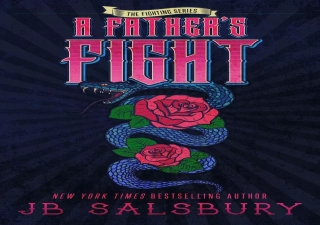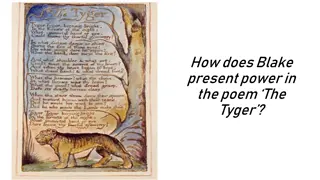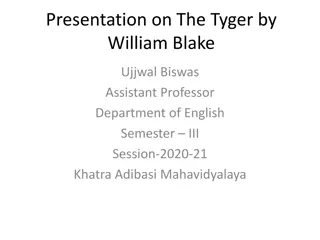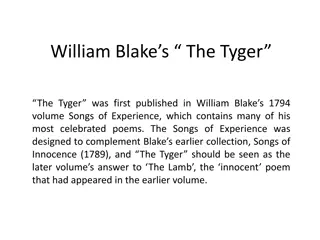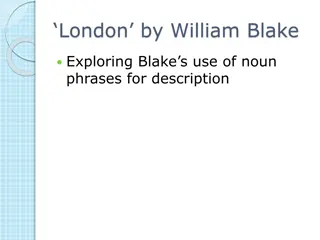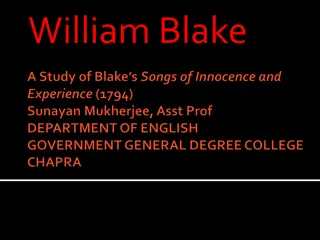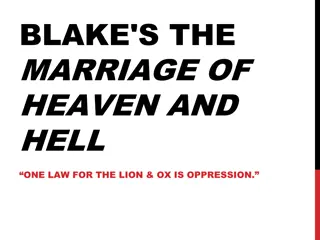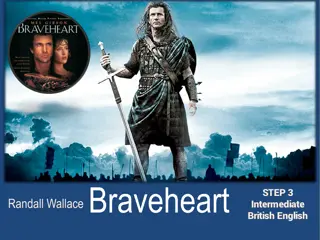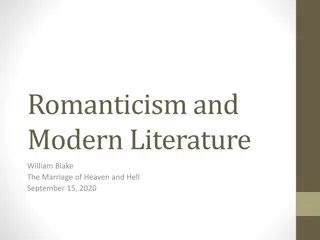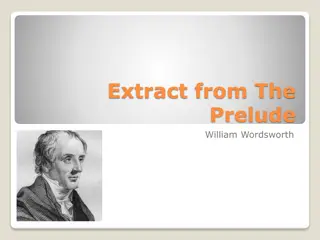Insights into the Life and Work of William Blake
William Blake, a visionary poet and artist, was born in 1757 in London. Despite facing lack of literary recognition during his lifetime, he left a lasting impact with his rebel spirit, critiquing societal injustices and advocating for freedom. Themes of innocence, experience, and imagination are central to his work, reflecting his belief in the power of the human spirit to transcend oppression and embrace creativity.
Download Presentation

Please find below an Image/Link to download the presentation.
The content on the website is provided AS IS for your information and personal use only. It may not be sold, licensed, or shared on other websites without obtaining consent from the author.If you encounter any issues during the download, it is possible that the publisher has removed the file from their server.
You are allowed to download the files provided on this website for personal or commercial use, subject to the condition that they are used lawfully. All files are the property of their respective owners.
The content on the website is provided AS IS for your information and personal use only. It may not be sold, licensed, or shared on other websites without obtaining consent from the author.
E N D
Presentation Transcript
William Blake: Life William Blake was born in 1757, in London. Endowed with artistic talent, he was sent to a drawing school at the age of ten. Blake turned to poetry when he was almost thirty, and his first collection of poems, Poetical Sketches, was published in 1783. Although he is now well-known as a poet, during his life he wasn t appreciated by the reading public, while engraving and painting represented his source of income. His last years were spent in loneliness. Depressed because of the lack of literary recognition, Blake died in 1827.
Blake: a rebel and visionary poet Harsh critic of his society in the name of freedom from all types of tyranny As a free spirit Blake was enthusiastic about the French Revolution and, on the other hand, he strongly criticized the England of his time where the exploitation of children, the appalling conditions of slums, the indifference of institutions were the causes of much suffering. Moreover, in his visionary idea of freedom, he rejected any forms of political, social and religious oppression. Prisons are built with stones of Law, Brothels with Bricks of Religion (Proverbs of Hell)
Themes: Child In this society where the evil effects of the industrialization are everywhere, Blake counterposes the innocente figure of Child. The theme of childhood is an important theme in Blake s production, in particular in Songs of Innocence. Childhood= state of innocence and purity which is lost in maturity Experience= degraded state of soul which destroys innocence. It is characterized by materialism, corruption and moral laws. Innocence and Experience are complementary states of human life, since they can neither be separated nor eliminated from the heart of man. Similarly, he sees Heaven and Hell as opposed but necessarily coexistent, because they are both important in God s creation.
Theme: Imagination As a romantic poet, he rejected the idea that reason was the man s unique ability to know reality. Blake repalced reason with imagination. Imagination = the capacity to see beyond the surface of reality, to penetrate the life of things more deeply. It is the real essence of the man. This real essence is divine. MAN= IMAGINATION= GOD God is man himself when the latter uses imagination. The fact is that man has lost the possibility of using his imagination because of the many restrictions and constraints imposed upon him by reason on one side and society on the other. By contrast, this power is peculiar to the child, the man in a state of innocence, and the poet, capable of using it in a more natural way. What s the solution? Man should awaken the imagination by breaking any types of chains (moral, social, political ) and by living in a more spontaneous and genuine way


